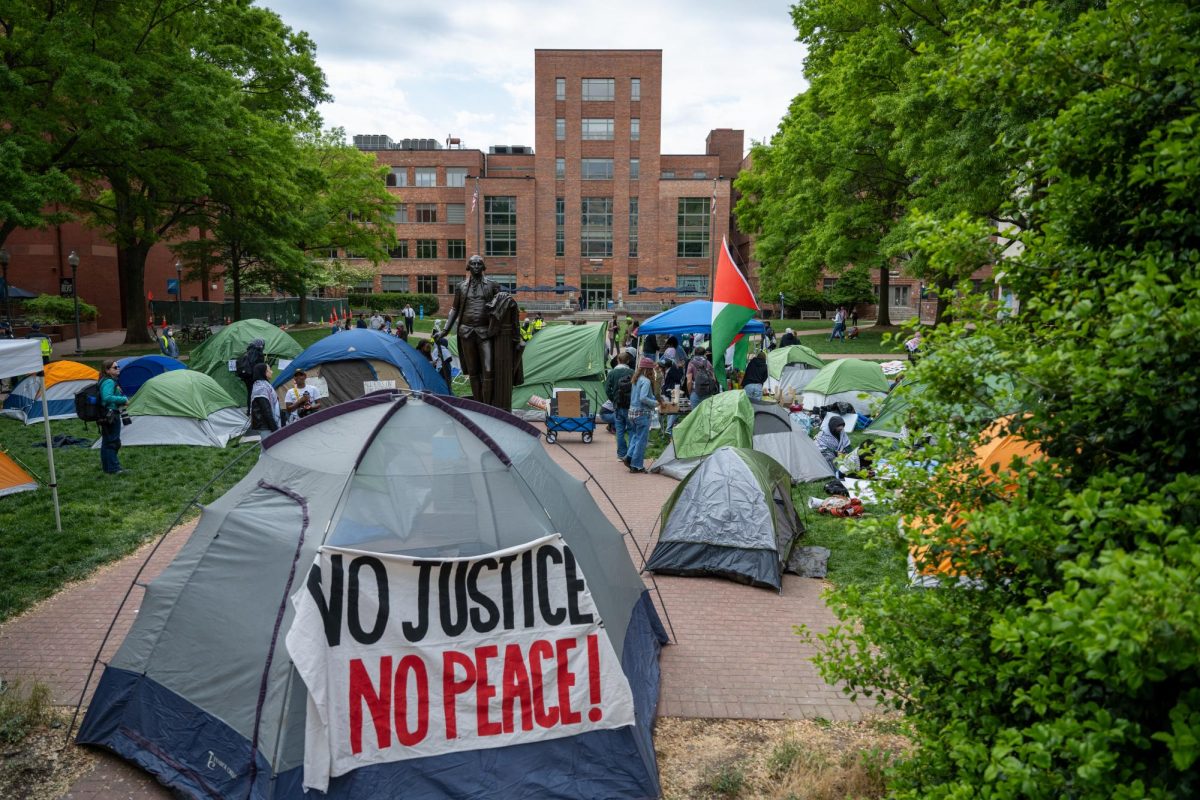Columbia Plaza residents are seeking to enlist the help of attorneys to demand more details about a mostly shrouded agreement between building management and GW, saying the University’s recent inclusion of the complex in its housing lottery is the first sign of a complete takeover.
Members of the Columbia Plaza Tenants’ Association said they will employ a lawyer to demand information from GW and Columbia Plaza transactions, and bring litigation against the parties if they do not receive enough information.
GW owns about 28 percent of the complex, and has the right to buy and rent to students and staff all rooms that open until it owns 28 percent of the rooms – or about 200 rooms. But tenants said little else is known about the agreement between GW and building management.
“It seems from all actions taken, there’s a partnership between the (complex ownership) and the University,” said resident J.P. D’Andino at a tenants’ association meeting closed to building management Thursday.
“We don’t know what’s in the contract,” CPTA member Craig Johnson said. “The way it’s sounding is they’re going to buy it and turn it into a dormitory.”
Tenants said GW may acquire the entire Columbia Plaza complex as soon as this summer. Once owners of the complex pay off loans to the Department of Housing and Urban Development – something GW Associate General Counsel Linda Schutjer said will happen “very shortly” – the University could purchase the remaining share.
“GW is getting bigger, there isn’t enough room,” said sophomore Miriam Zimet, a Columbia Plaza tenant. “You throw enough money at Columbia Plaza and they’ll sell it.”
Marilyn Rubin, president of the building’s tenant association, said GW has eyed the land where Columbia Plaza sits for some time, and he believes the HUD loans will expire May 13, opening the doors for GW.
“For 10 years I’ve been crying wolf,” Rubin said Thursday. “The wolf is inside the door now.”
According to D.C. law, if a party purchases the entire complex within 12 months, tenants can form an association and bring in third-party investors to buy and manage the building themselves, Schutjer said.
GW once attempted to buy The President apartment building on Eye Street between 22nd and 21st streets, but the building’s tenants chose to assume control of the building, Schutjer said.
Schutjer said the University currently has no plans for purchasing more shares of Columbia Plaza, and a takeover of the complex in the near future is “not a feasible thing.”
“If someone came to us with shares to purchase, we would make that evaluation,” she said. “We’re going to be here for many years, we’ll see what happens.”
The total real estate assessed property value for Columbia Plaza land and buildings is $53.6 million, according to 2001 tax records.
Last month GW announced a plan to offer juniors and seniors housing in Columbia Plaza, through the March housing lottery. By signing a housing contract with GW’s Columbia Plaza Housing Program, students bypass the income requirement and security deposit required of tenants who lease through the apartment’s rental office.
Before January prospective tenants had to show their total assets equaled the amount of one year’s rent. Now tenants who do not go through GW must show that their income equals as much as $90,000 for two bedroom apartments – a much more difficult requirement for college students to meet, tenants said.
When a room in Columbia Plaza is vacated, the apartment’s management first notifies GW Housing Services, which maintains a waiting list of faculty, undergraduate and graduate students interested in moving into the building.
Students living in the apartments through GW’s program are subject to the Student Code of Conduct, an agreement GW officials said they created to ease tenant concerns about student behavior.
Once GW has filled about 28 percent of the building’s rooms, Columbia Plaza can again offer vacancies to the general public. Students who signed a lease through the Columbia Plaza rental office are not considered part of GW’s 28 percent.
“If that isn’t discrimination, where you have given the University carte blanche (first right of refusal), than I don’t know what is,” Rubin said.
The Fair Housing Act prohibits building management from setting different terms, conditions or privileges for sale or rental based on race, ethnicity, religion, sex, family status or disability.
Schutjer said the University discounted any discrimination issues because anyone can become a GW student. She said any attempts by Columbia Plaza to keep students out of the complex would be unjustifiable.
“It violates D.C. human rights law to discriminate because people are students,” she said.
At Thursday’s meeting, tenants said they want more information from GW and building management.
“They need to be more forthcoming and let people know what’s happening,” Johnson said. “There are hundreds of people affected in the complex.”
Others expressed the need to fight further GW expansion.
“This is a retroactive campaign to save the place (where) we live,” D’Andino said. “We either fight as a group, or we sink and drown individually.”







